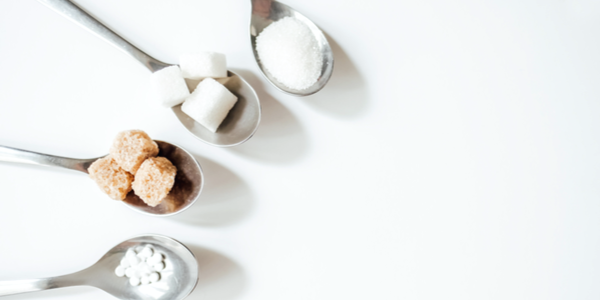
Confused about going sugar-free with sugar substitutes? With warnings of aspartame dangers and high-sugar diet risks, feeling confused is not so surprising.
So, what do dietitians and nutrition experts say about sugar-free diets, sugar substitutes, and artificial sweeteners? Read on to learn more about common sugar-free sweeteners.
Artificial Sweeteners vs Sugar
Artificial sweeteners mimic the effects of sugar in the body. Essentially, artificial sweeteners interact with body receptors while being ingested. These receptors send messages to the brain that act as a signal.
To the brain, it does not matter if the sweetness is artificial or actual - hunger signals interestingly still react the same way.
Evidence on artificial sweeteners lacks a conclusive answer in most cases, though experts find people tend to eat more carbs and sugars to satisfy the body's signals from sweets. This usually leads to weight gain, which is often the opposite desired outcome when switching to artificial sweeteners.
Different Types Of Sugar Substitutes
From ketchup to cakes, sugar can be found in nearly everything. Sugar substitutes generally fall into three main categories. functional sweeteners, artificial sweeteners, and enhancing natural sweeteners/sweet taste enhancers.
Artificial Sweeteners Examples
In the American diet, diet beverages are a significant source of artificial sweeteners. They tend to replace healthful meals and snacks while not providing any real nutritional value.
The common saying "do not drink your calories" might be right. Sugary drinks are a top source of sugar and cause a quick blood sugar spike in the body.
Artificial sweeteners are generally derived from naturally occurring substances (i.e. monk fruit) but are produced synthetically. They include:
• Aspartame
• Acesulfame potassium (Acesulfame K, Sunett®, Sweet One®)
• Neotame
• Saccharin (Sweet 'N Low®, SugarTwin®)
• Sucralose (Splenda®)
• Stevia (Truvia®)
• Luo han guo (Monk fruit extract)
• Advantame
Sugar Alcohol Examples
Common types of sugar alcohols include:
• Erythritol
• Hydrogenated starch hydrolysates (HSH)
• Isomalt
• Lactitol
• Maltitol
• Mannitol
• Sorbitol
• Xylitol
Natural Sugar Substitutes
Natural sweeteners are also known as natural sugars. In other words, they naturally occur with little processing. Sugar substitutes without chemicals, such as the following, make it easy to enjoy a sweet treat:
• Honey
• Maple syrup
• Coconut sugar
• Date sugar
• Dates
• Blackstrap molasses
• Agave nectar
Other Names for Sugar
Sugar is a sneaky ingredient that can go by other names:
• Anhydrous dextrose
• Cane juice
• Corn sweetener or corn syrup
• Crystal dextrose
• Dextrose
• Evaporated corn sweetener
• Fructose
• Fruit nectar
• Fruit-juice concentrate
• Glucose
• High-fructose corn syrup (HFCS)
• Invert sugar
• Lactose
• Liquid fructose
• Maltose
• Malt syrup
• Molasses
• Nectars
• Sugar cane juice
• Syrup
• Trehalose
Sugar Substitutes and Your Health
When it comes to sugar-free sweeteners and side effects, knowing the facts is essential. Understanding sugar substitute pros and cons can help in making the most informed health decision.
Potential Benefits of Sugar Substitutes
Sugar and sugar substitutes have their place in a healthy diet. However, many experts consider the added sugar recommendations set by the American Heart Association (AHA) to be higher than it should be.
To make matters worse, Americans consume over two times the recommended amount per day. In a year, the average American may drink more soda than they do water.
For those with diabetes, hypertension, and high blood sugar, guided use of artificial sweeteners or sugar substitutes can help with disease management. Finding nutritious sugar substitutes can be even better than artificial sweeteners at minimizing symptoms and maximizing health benefits.
Potential Risks of Sugar Substitutes
In a person of average health, it is predicted that toxicity may occur at high levels or with prolonged exposure. That being said, instead of focusing on cutting sugar out, focus on adding nutritious sugar substitutes. Individuals with allergies and sensitivities need to examine food labels to decide what sweetener is best.
Despite general safety for most people, a common sugar substitute side effect is gastrointestinal distress. For example, some sugar alcohols (i.e. mannitol or sorbitol) cause the following:
• Excessive bloating
• Loose stools
• Abdominal gas
• Diarrhea
• Laxative effect
Sugar alcohols can cause these symptoms because they are not completely absorbed from the small intestine into the blood. Instead, they are fermented by bacteria in the large intestine. Long-term gut inflammation can potentially be problematic.
In terms of aspartame danger, studies show that it is 200 times sweeter than sugar and has been implicated in serious health problems despite a hard link between artificial sweeteners and birth defects, cancer, or behavioral problems. These studies have also been conducted on animal models, making it hard to find conclusive evidence.
Experts recommend caution for people:
• Taking certain medications (i.e. levodopa, neuroleptics)
• With the muscle disorder tardive dyskinesia
• Who have sleep, anxiety, or mental health disorders
What's more, aspartame (Equal® or NutraSweet®) cannot be consumed by people with phenylketonuria (PKU). This is due to the fact that aspartame contains phenylalanine.
Some evidence points to artificial sweeteners as a source of weight gain since "sugar-free" does not equal "calorie-free". In some cases, artificial sweeteners increase sugar cravings for more sweet treats. This can ultimately increase insulin resistance.
Sugar Substitutes Recommendations
Which sugar substitutes are healthy? For a person not managing a diabetes diagnosis, dietitians recommend natural sources of sweetness or small amounts of table sugar.
Top sources of natural sweeteners that nutrition experts recommend in moderation include:
• Honey
• Maple syrup
• Coconut sugar
• Date sugar
• Dates
• Blackstrap molasses
• Agave nectar
Each sweetener performs differently, both as part of a recipe and in terms of the human body. There is an element of trial and error when trying to find a good fit.
Some sugar substitutes considered "healthy" are not as they seem. For example, not all maple syrups are created equal. In fact, some “maple syrup” is actually high fructose corn syrup with maple flavoring and artificial color.
For most individuals, examining sugar substitutes for nutrition information is helpful. Dietitians can help individuals create custom plans for sugar intake and overall health goals.
Sugar Substitutes with Low Glycemic Index
Sugar substitutes that fall lower on the glycemic index can be a great option for alternative sweeteners. The glycemic index measures how much a certain food increases blood sugar levels.
Foods that are higher in refined carbohydrates and sugar more often have a high glycemic index. In contrast, a substitute like coconut sugar is considered lower on the scale compared to table sugar. Since it comes from coconuts, it provides prebiotics and minerals.
Sugar Alternatives in the Kitchen
Foods like applesauce and bananas may be able to take the place of sugar in certain recipes. Spices like cinnamon and nutmeg can also add a hint of sweetness and flavor.
Added sugars lurk in surprising places. Experts recommend making the following items homemade when possible to avoid sneaky sources of sugar:
• Whole-grain cereals and granola
• Instant flavored oatmeal
• Frozen meals
• Granola bars, protein bars, and cereal bars
• Pasta sauce
• Dried or preserved fruit, applesauce, and fruit juices
• Baby food
• Barbecue sauce, ketchup, salad dressing, and other condiments
Try sweetening the following with healthy sugar alternatives:
• Coffee or tea
• Mixed drinks
• Plain yogurt
• Oatmeal or baked oatmeal
• Baked goods (i.e. muffins)
• Pancakes and batters
Also, know that not all sugar substitutes compare in a 1:1 ratio or conversion. For example, swap a mashed banana for 1/4 to 1/3 of the granulated sugar in quick breads, cakes, or muffins. Pay attention to conversion charts on boxes and labels, and start out by using the recommended amount of sugar substitute.
In general, recipes can experience a 25 percent reduction in sugar without noticeable changes in taste. That means if a recipe calls for 4 tablespoons, try reducing the amount of sugar to 3 tablespoons and see if it makes a difference. Recipes may need a bit more liquid to compensate for the decrease in sugar content
Overall, when using sugar-free sweeteners for baking, keep in mind that they can be used in lesser amounts. This is because they tend to be sweeter or more concentrated than conventional sugar.
In Summary On Sugar Substitutes
Sugar substitutes and alternative sweeteners can be used in the place of sugar. However, artificial sweeteners can pose health risks to certain populations.
To lower potential risks tied to artificial sweeteners, check the label for nutrition information and ingredients. Also, focus on adding nutrient-dense ingredients that have a lower glycemic index into the diet.
For example, protein bars sometimes contain sugar-free sweeteners. These options can be great for a quick and convenient snack, but they should not replace a well-balanced meal when possible.
A health expert, such as a dietitian, can also help determine if and how sugar substitutes can fit into an individual diet plan.
References:
Ansel K. Are Artificial Sweeteners Safe for Kids? Eat Right. Published April 8, 2021. https://www.eatright.org/food/nutrition/nutrition-facts-and-food-labels/are-artificial-sweeteners-safe-for-kids.
Baritta R. Taking a Closer Look at Stevia. Food & Nutrition. Published November 4, 2013. https://foodandnutrition.org/blogs/stone-soup/taking-closer-look-stevia/.
Breshears S. Curious About Artificial Sweeteners? National Kidney Foundation of Hawaii. https://kidneyhi.org/dietitian-blog/curious-about-artificial-sweeteners.
Cording J. Looking to Reduce Your Family's Intake of Added Sugars? Here's How. Eat Right. Published September 9, 2020. https://www.eatright.org/food/nutrition/dietary-guidelines-and-myplate/looking-to-reduce-your-familys-added-sugar-intake-heres-how.
Cox J. Healthy Baking Alternatives. Eat Right. Published October 8, 2019. https://www.eatright.org/food/planning-and-prep/cooking-tips-and-trends/healthy-baking-alternatives.
Fenton S. Are Sugar Substitutes Okay For Your Kidneys? National Kidney Foundation. Published September 12, 2017. https://www.kidney.org/newsletter/are-sugar-substitutes-ok-your-kidneys.
Gordon B. The Scoop on Added Sugars. Eat Right. Reviewed March 2021. https://www.eatright.org/food/nutrition/nutrition-facts-and-food-labels/the-scoop-on-added-sugars.
Klemm S. Sugar Substitutes: How Much is Too Much? Eat Right. Published December 11, 2018. https://www.eatright.org/food/nutrition/dietary-guidelines-and-myplate/sugar-substitutes-how-much-is-too-much.
Link R. Glycemic Index: What It Is and How to Use It. Healthline Published June 2, 2020. https://www.healthline.com/nutrition/glycemic-index.
Milk & Honey Nutrition, LLC. Artificial sweeteners, sugar alcohols, and natural sweeteners: Are they ok and how much can you use? Milk & Honey Nutrition. https://www.milkandhoneynutrition.com/artificial-sweeteners-sugar-alcohols-and-natural-sweeteners-are-they-ok-and-how-much-can-you-use/.
Segrave-Daly D, Ball S. Healthy Kitchen Hacks: Banana Rescue. Food & Nutrition. Published October 29, 2018. https://foodandnutrition.org/from-the-magazine/healthy-kitchen-hacks-banana-rescue/.
U.S. Food & Drug Administration. Sugar Alcohols. U.S. Food & Drug Administration. https://www.accessdata.fda.gov/scripts/InteractiveNutritionFactsLabel/sugar-alcohols.cfm.
Zeratsky K. My favorite diet soda has a warning about phenylalanine. Is phenylalanine bad for your health? Mayo Clinic. Published December 23, 2020. https://www.mayoclinic.org/healthy-lifestyle/nutrition-and-healthy-eating/expert-answers/phenylalanine/faq-20058361.







